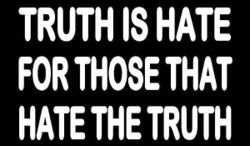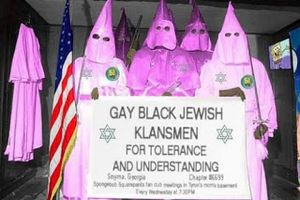Difference between revisions of "Hate crime"
| Line 17: | Line 17: | ||
=="Fake hate crimes"== | =="Fake hate crimes"== | ||
| − | A "fake hate crime" is a [[false flag]] hate crime and may make up a large proportion of hate crimes. They often include alleged incidents of racism such as name calling or graffiti.<ref>https://www.westernjournal.com/list-hoax-hate-crimes-trump-era/</ref> These experienced a large rise in popularity in the US since about 2015, but since the [[FBI]] did keep separate track of them as of 2017, quantification is difficult. | + | A "fake hate crime" is a [[false flag]] hate crime and may make up a large proportion of hate crimes.<ref>https://www.amren.com/archives/reports/hate-crime-hoax-map/</ref> They often include alleged incidents of racism such as name calling or graffiti.<ref>https://www.westernjournal.com/list-hoax-hate-crimes-trump-era/</ref> These experienced a large rise in popularity in the US since about 2015, but since the [[FBI]] did keep separate track of them as of 2017, quantification is difficult. |
===Growth in USA=== | ===Growth in USA=== | ||
Revision as of 15:49, 29 June 2019
(discrimination, enemy image, plastic phrase) | |
|---|---|
 | |
| Interest of | • Antifa • Southern Poverty Law Center • Humza Yousaf |
| The phrase "hate crime" is a plastic phrase associated with the "hate speech" effort to stifle free speech on the internet. | |
"Hate crime" is one of a set of plastic phrases used to try to facilitate the introduction of laws that stifle free speech and end anonymity on the internet.
Contents
Official narrative
The idea of "hate crime" and "hate speech" goes back to the 1960s.[1] A "hate crime", according to Wikipedia as of April 2019 is "(also known as a bias-motivated crime or bias crime[1]) is a prejudice-motivated crime which occurs when a perpetrator targets a victim because of his or her membership (or perceived membership) in a certain social group or race." It notes that "term "hate crime" came into common usage in the United States during the 1980s." Such crimes are particularly heinous and deserve special laws.[2]

Interpretation
Since 2016, Louisiana law includes resisting arrest as a hate crime, punishable by a fine of up to $5,000 or a 5 year prison sentence. The law was part of a surge of similar legislation introduced around the US.[3]
"Fake hate crimes"
A "fake hate crime" is a false flag hate crime and may make up a large proportion of hate crimes.[4] They often include alleged incidents of racism such as name calling or graffiti.[5] These experienced a large rise in popularity in the US since about 2015, but since the FBI did keep separate track of them as of 2017, quantification is difficult.
Growth in USA
These have experienced a large rise in popularity in the US since about 2015 but, since the FBI did not keep separate track of them as of 2017, quantification is difficult.
A website, http://fakehatecrimes.org attempts to keep track of fake hate crimes in the USA. Inspiration for this trend may be a growing awareness of the Mossad's long history of false flag attacks against Jewish targets, to try to raise sympathy for the cause of "antisemitism".[citation needed]
Associated concepts
"Hate group"
- Full article: “Hate group”
- Full article: “Hate group”
A "hate group" is a group which promotes a "hateful" ideology such as racism or sexism. These groups are a special focus of the Southern Poverty Law Center, which staff members alleged in March 2019 itself suffered from a "systemic culture of racism and sexism within its workplace."[6]
Hate speech
- Full article: “Hate speech”
- Full article: “Hate speech”
"Hate speech" is part of the ongoing effort to restrict free speech. In 2019, the Austrian government was considering a (widely criticised)[7] policy of outlawing internet anonymity on grounds of "hate speech".[8]
An example
| Page name | Description |
|---|---|
| "Online hate crime" |
Related Quotation
| Page | Quote | Author |
|---|---|---|
| "Hate speech" | “The further a society drifts from truth the more it will hate those who speak it.” | George Orwell |
Related Documents
| Title | Type | Publication date | Author(s) | Description |
|---|---|---|---|---|
| Document:Putting the Word "Hate" into Proper Context | webpage | 16 May 2017 | Russ Winter | |
| Document:Someone said they wanted to see me trapped in a burning car and watch flames melt my flesh | Article | 22 October 2021 | Nadine Dorries | After the murder of MP David Amess, a crackdown on "internet trolls" is being demanded by most politicians. The UK's new Culture Minister Nadine Dorries is pursuing new overreaching legislation regulating Big Tech. The "Online Safety Bill" will abolish online anonymity and empower internet censorship. There are fears that it will be the end for freedom of expression in the UK. |
An official example
| Name |
|---|
| 2016 Orlando nightclub shooting |
References
- ↑ https://www.cairn-int.info/article-E_RAI_063_0035--the-rise-of-hate-speech-and-hate-crime.htm
- ↑ https://en.wikipedia.org/w/index.php?title=Hate_crime&oldid=890928297
- ↑ https://reason.com/2017/01/23/louisiana-police-chief-resisting-arrest
- ↑ https://www.amren.com/archives/reports/hate-crime-hoax-map/
- ↑ https://www.westernjournal.com/list-hoax-hate-crimes-trump-era/
- ↑ https://edition.cnn.com/2019/03/29/us/splc-leadership-crisis/
- ↑ https://www.wired.co.uk/article/real-name-policies-anonymity-online-harassment
- ↑ https://www.thelocal.at/20190410/austria-mulls-user-registration-for-online-platforms
